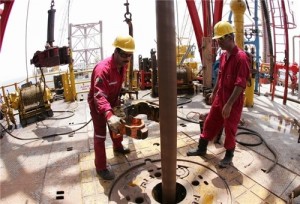 The Iranian nuclear deal has struck an optimistic tone in the Middle East, Ayyub writes, and officials in the United Arab Emirates are taking the opportunity to increase energy cooperation with Iran. That collaboration threatens to further erode Saudi Arabia's influence over the region's oil.
The Iranian nuclear deal has struck an optimistic tone in the Middle East, Ayyub writes, and officials in the United Arab Emirates are taking the opportunity to increase energy cooperation with Iran. That collaboration threatens to further erode Saudi Arabia's influence over the region's oil.As the Iranian nuclear deal begins to take effect and international pressure on the regime continues to diminish, Gulf nations have begun re-establishing diplomatic and economic relations with their once-distant neighbor. The deal has struck an optimistic tone in the�Middle East, and officials in the�United Arab Emirates�are taking the opportunity to settle old disputes and increase energy cooperation with their neighbor across the Gulf.
offers extensive coverage of all energy sectors from crude oil and natural gas to solar energy and environmental issues. To see more opinion pieces and news analysis that cover energy technology, finance and trading, geopolitics, and sector news, please visit�Oilprice.com.
Iran�and the UAE are close to reaching an�agreement�on three long-disputed islands near the�Strait of Hormuz, perhaps the world�s most important oil chokepoint. The strait carried roughly�35�percent of all seaborne traded oil in 2011. According to a high level UAE source, �Iran will retain sea bed rights around the three islands while the UAE will hold sovereignty over the land.� Omani officials mediated the talks.
While the deal could prove positive for the UAE�s economy, it effectively isolated�Saudi Arabia�from the negotiating table on a key issue affecting both the�Gulf Cooperation Council (GCC)�and global oil trade. Saudi Arabia ships three times more crude oil through the Strait of Hormuz than any other Gulf nation (see graphic above).� And yet, as Saudi Arabian influence over the GCC continues to erode, countries in the Gulf have distanced themselves from the Kingdom�s confrontational position on Iran.
The deal with the UAE is just the latest sting to Saudi Arabia from its fellow GCC members and�Organisation of Petroleum Exporting Countries�(OPEC) nations. Oman is planning to build a�pipeline�connecting it with Iran�s natural gas fields as part of a $60 billion deal to increase cooperation and trade between the two countries. Iraq recently�announced�its plans to collaborate with Iran to increase its oil production capacity to 9 million barrels per day (bpd), challenging Saudi Arabia�s domination of OPEC. The Kingdom produced 9.8 million bpd in December 2013.
Saudi Arabia changes its strategy
Saudi Arabia continues to find itself pitted against Iran, both on the battlefield in Syria and at economic conferences in�Davos. And while the Kingdom enjoys relative economic prosperity, it has taken steps to lessen its reliance on its massive oil resources, perhaps to the benefit of investors.
Emaar Economic City, a massive Saudi real estate firm, recently�started�operations on the country�s first privately owned port up Saudi Arabia�s�Red Sea�coast. The project will include the construction of a special economic zone, named�King Abdullah Economic City�(KAEC). The city will host as many as 2 million people and will help diversify Saudi�s economy beyond oil, into shipping, pharmaceuticals and packaging.
�Twenty five percent of global trade goes through the Red Sea but we�ve never leveraged it in the region,� Emaar CEO Fahd Al Rasheed said at the�World Economic Forum�in Davos. The Red Sea sees shipping and oil traffic mostly bound for Europe and the western hemisphere via the Suez Canal. The project is expected to be completed by 2020 and has the potential of becoming a global logistics hub, �handling trade for the entire region.�
The project is also a positive sign for investors. Although the special economic zone has Saudi government backing, it is operated by a private company with a local stock market listing, which could help to spread the wealth generated by the project to both investors and the local population.
Saudi Arabia has made attempts to lessen its dependence on oil domestically, as well. In January, the country signed�deals�with French and Japanese companies that aim to support Saudi Arabia�s nuclear energy program. Despite its large oil production and position as the Middle East�s biggest oil consumer, Saudi does not generate enough electricity to meet its domestic consumption.
The World Economic Forum recently�ranked�countries based on domestic energy security, and Saudi Arabia came in at 91 out of 124 countries. The energy shortfalls are mostly derived from Saudi�s growing population and subsequent increased energy demand. The U.S. Energy Information Administration�reports�that �rising domestic energy consumption could result in the loss of 3 million barrels of crude oil exports per day.� With a growing population and energy demand increasing 8 percent annually, Saudi hopes a push toward nuclear energy will fulfill its domestic energy needs while freeing up more oil for exports.
As Saudi Arabia�s influence over the Gulf further erodes, the Kingdom must continue to invest in projects that diversify its revenues and resources, and sustain its competitive advantage. Iran may be the talk of the town, but Saudi�s strategy may prove just as pivotal to the future of the Gulf.
By The Christian Science Monitor�
The Iran Project is not responsible for the content of quoted articles.










